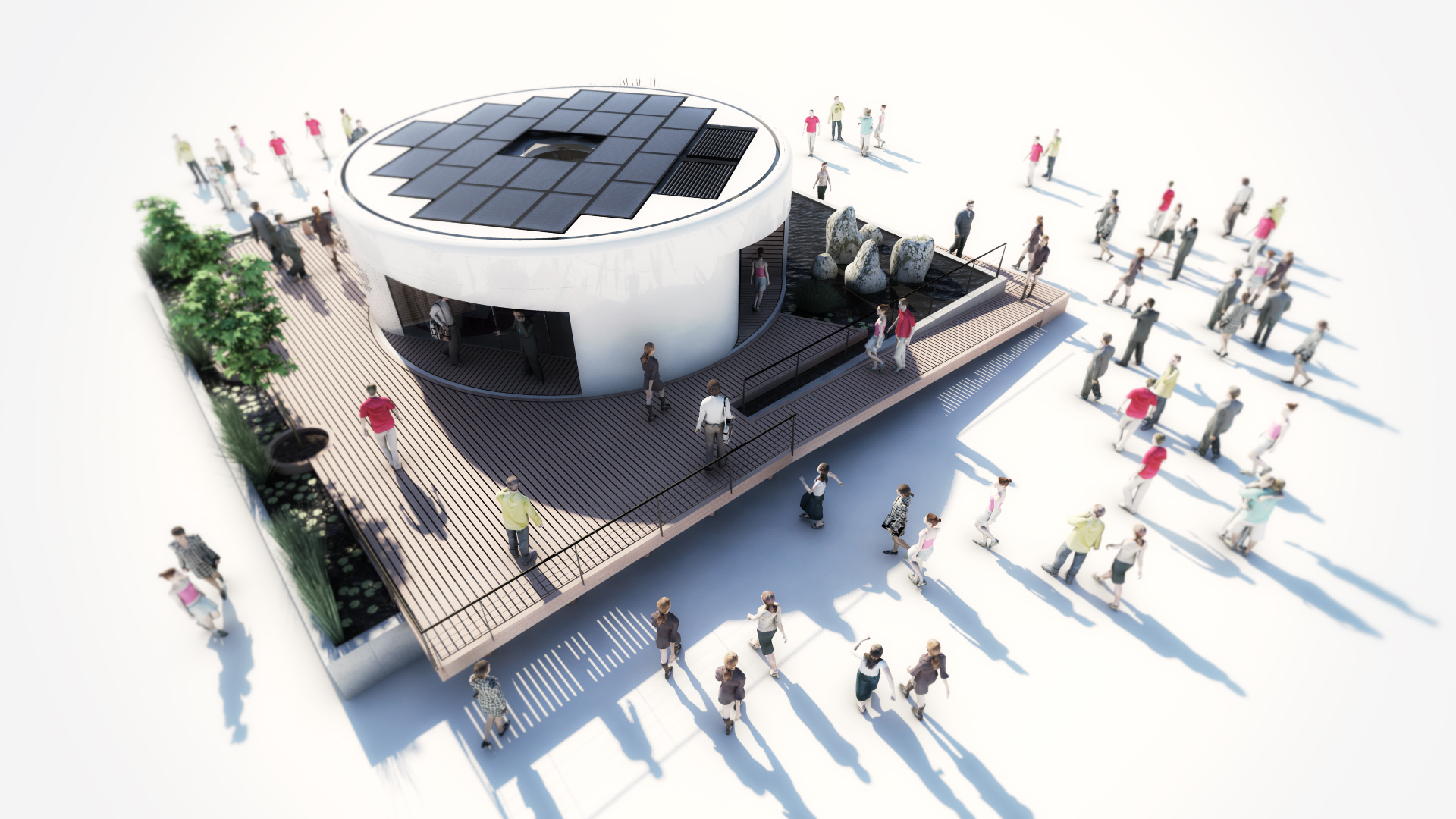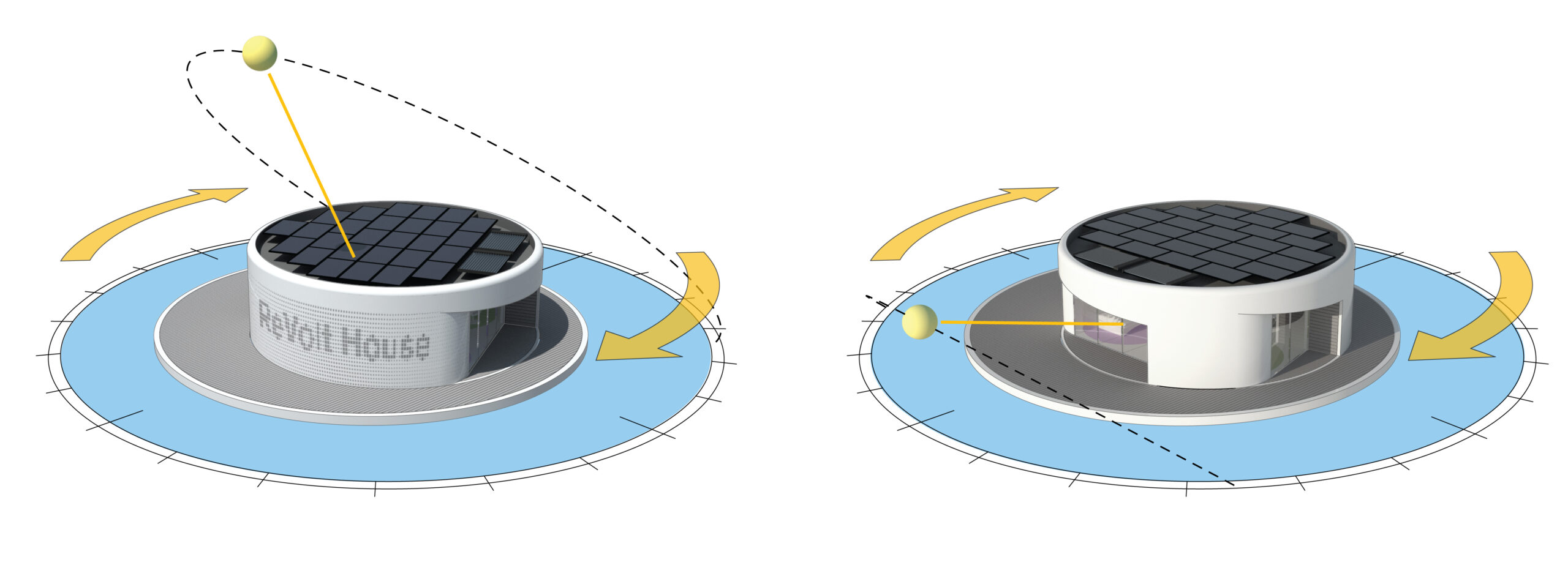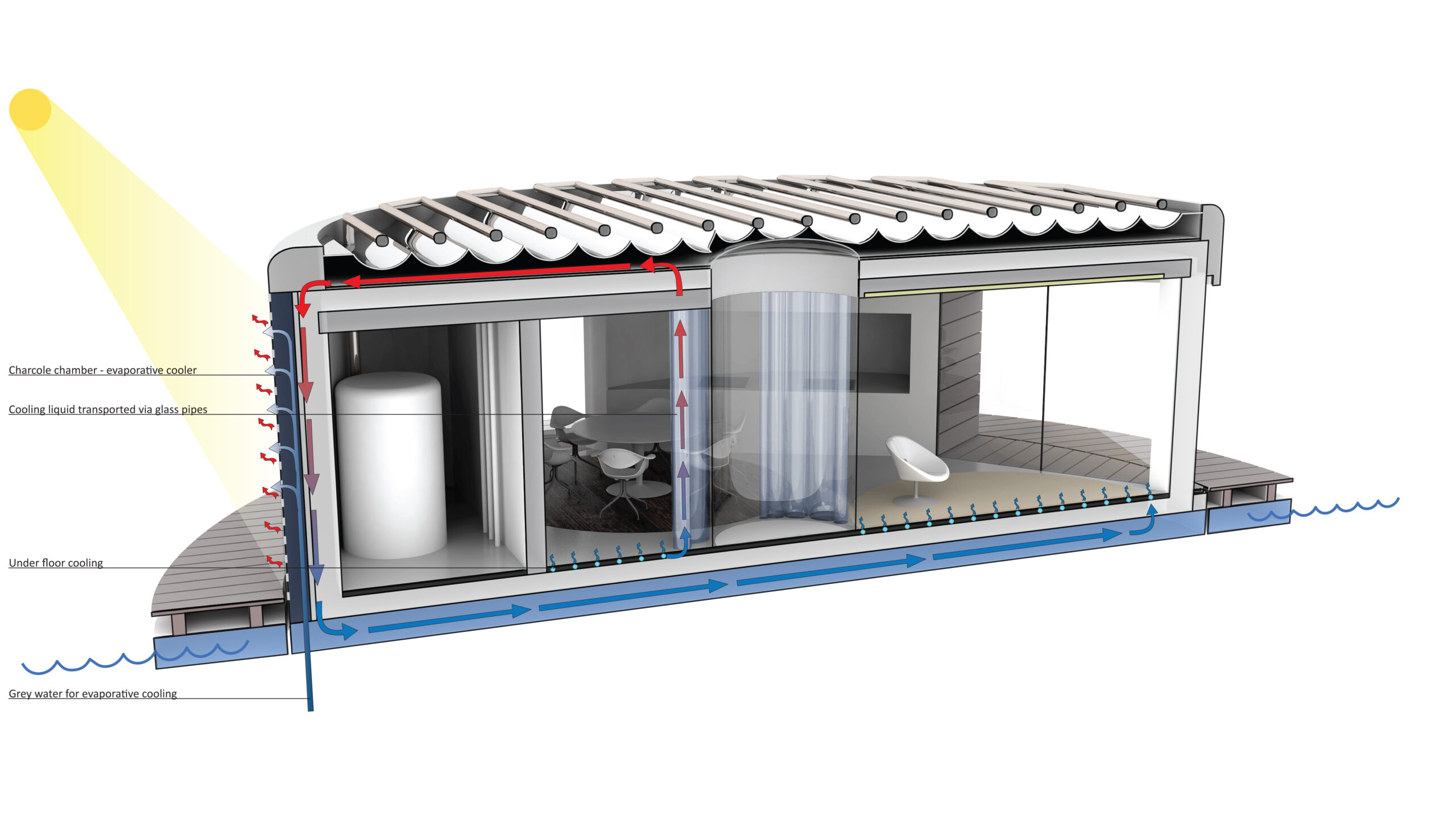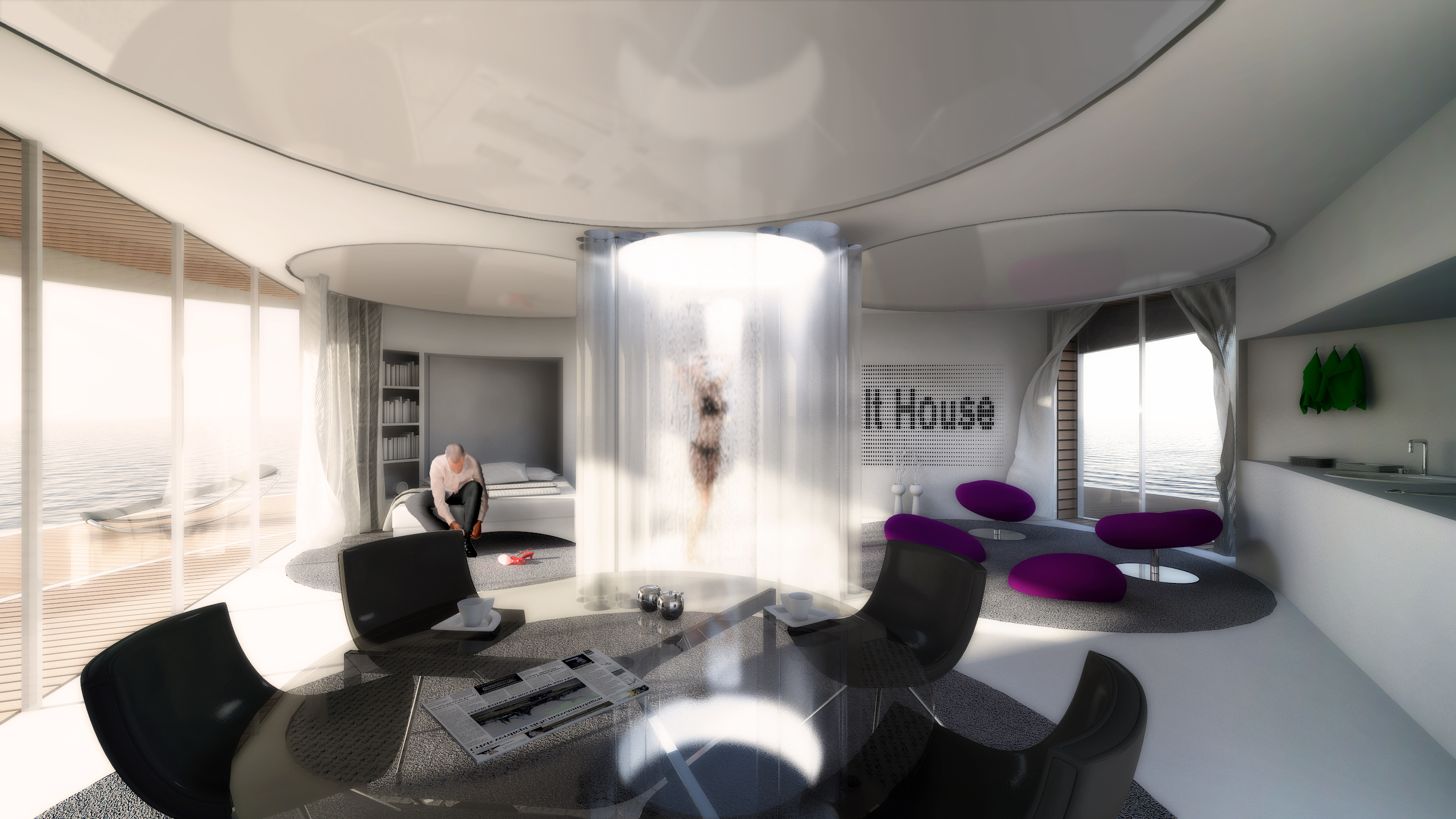ReVolt House
2012 Rotterdam sustainabilityThe ReVolt House is a floating and rotating dwelling designed by a multidisciplinary team of students from TU Delft for the Solar Decathlon 2012 competition. It aims to provide a dwelling that uses less energy without sacrificing comfort by integrating solar energy technology with appealing design in and being an example of sustainable development. In pushing the boundaries of building innovation the project raises awareness for cutting-edge building techniques that can improve the current strategies followed withing the building practice in the Netherlands and abroad. The determining parameters for the design are lightness, prefabrication, thermal performance, appearance, assembly and costs.
More Info
Design
Floating is representative of the Dutch context where water is abundantly present (partly as landscape, partly as a threat) and entire neighbourhoods are planned on water. The design of the house shows how to build in a sustainable way where the water/landscape gets tightly interwoven with the architecture and energy concept.
Rotating The house will rotate for climatic and energy aspects. One side of the house will have a closed facade, which will continuously face the sun summer, shading the interior and minimizing the solar heat gain. This “heat shield” will integrate a passive solar cooling system. Conversely, in winter, when the suns’ altitude is lower, the “open” glass facades will continuously face the sun. This generates a solar heat gain for the interior (passive heating), which requires less energy for an actual heating system. Since the house is floating frictionless on the water the rotation won’t require much of an effort.
Reduced energy consumption
Reducing energy demand is achieved by:
1. Improving the building and appliance’s properties
2. Lowering energy demand by altering user behaviour
While the first method has almost reached a threshold concerning optimal performance, the latter strategy has huge potential as human comfort is a state of mind, which can therefore be altered with appropriate stimuli.
The ReVolt House introduces a new type of user interface for the home automation system, which would be user-dependent. The system is able to learn user habits and comfort and consequently optimise them over time. The comfort analysis allows the user to indicate discomfort on a relative comfort scale, rather than on a Celsius range. For example, the system would be able to detect if the users are watching TV and dim the lights accordingly, running on a treadmill and reduce the needed amount of heating, or walk around in shorts during winter, in which the system would recommend wearing something more appropriate to reduce the heat demand.
Multidisciplinary team
The team was set-up by the Building Technology department of the Architecture Faculty, the Delft Energy Initiative and Energy Club and consists of international students from architecture, sustainable energy technology, civil engineering, policy and management.
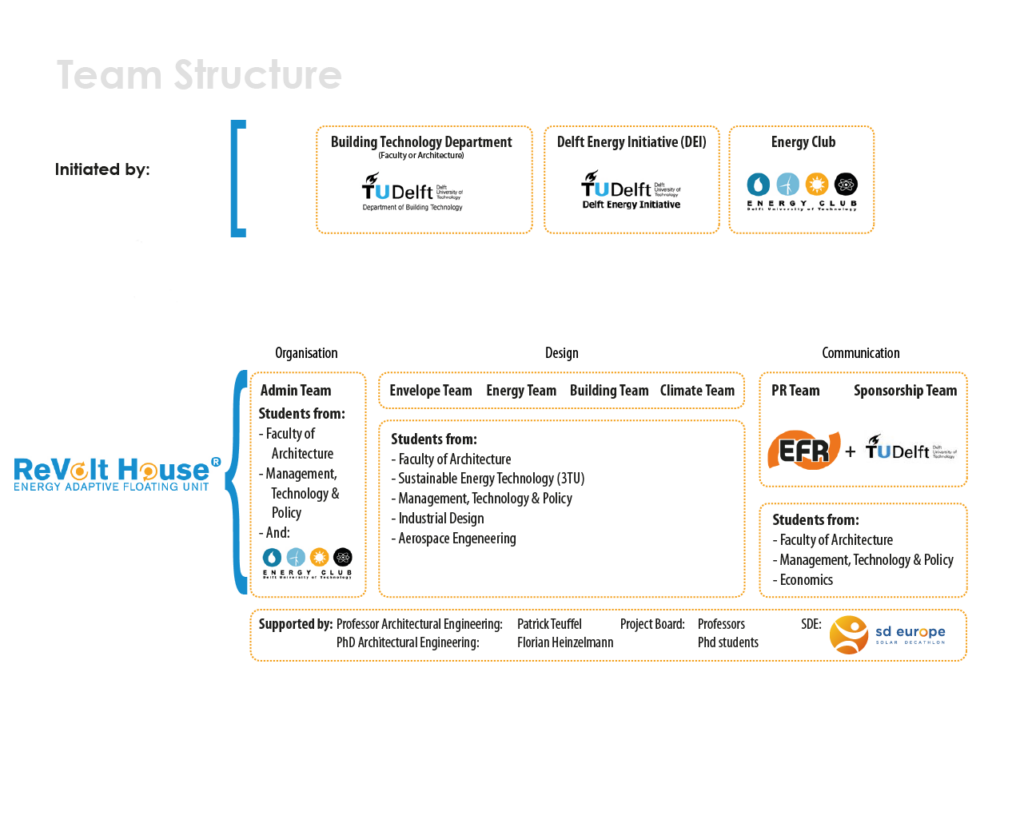
The Solar Decathlon
The original Solar Decathlon is a competition organized by the U.S. Department of Energy in 2002. Since then 20 Universities from across the globe meet every two years to design and build an energetically self-sufficient house at the National Mall in Washington DC. The houses solely run on solar energy and incorporate technologies that maximize its energy efficiency. In 2010 for the first time, a similar event was held in Europe. Solar Decathlon Europe aims to:
- Communicate our need to diminish our energy consumption, by changing our habits, and using technologies that reduce energy demand without affecting our lifestyle and comfort.
- Prove that the demands of lighting, heating, and refrigeration can be met with technologies in more efficient ways.
- Show how the energy required can be generated using renewable energy sources, such as solar radiation.
- Finally, integrate these changes in ways that are affordable, in conjunction with solid architecture practices. As European cities are often dense and have a long history, we try to develop ideas that can be transferred to other kinds of buildings, flats, or help to refurbish existing ones.
Selected Media
Credits
Team
Telesilla Bristogianni, Metin Celik, Caesar Christian, Itai Cohen, Tanja Dubbelaar, Erik Duijn, Filippo Doria, Bethzua Elizondo, Tim Hilhorst, Sjors Hijgenaar, Jorge Izar, Jorg Meij, Martin van Meijeren, Panos Papanastasis, Alexios Pagkozidis, Mariana Popescu, David Rodriguez, Panos Sakkas, Miguel Setas, Marcello Sosoeleman, Loes Thijssen, Sergio Torres, Bernardo Valladares, Joseph Vitolla
Faculty Project Board
Patrick Teuffel (project director), Florian Heinzelmann (project manager), Ulrich Knaack, Andy van den Dobbelsteen, Arijan van Timmeren, Thijns Asselbergs, Nimish Biloria, Rudi Stouffs, Kees van der Linden, Kenneth Heijns
Sponsors
Unive, Holland Composites, Wagner&Co Solartechniek, Sky-Frame, Oxycom, Panasonic Sanyo, DSM, Schneider Electric, Demo Tu Delft, WNF, StuD, Knigspan, NRG TEQ, Priva, ESA Comp/Componeering, Weefers, Orca3D, Virtual Shape Research, Ducona, Antenna-Men, Serge-Ferrari, Tentech, DeltaSync, Technea Duurzaam, Spinware Solutions, Ecofyt
